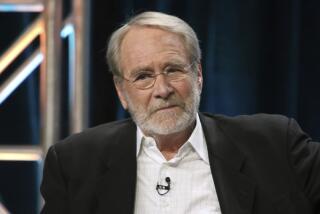Mudd Viewed Relationship to Mistress Like Marriage, Son Testifies : Trial: Harvey S. Mudd II takes stand for Eleanor (Lorraine) Oliver. But attorneys counter with ’89 letter.
- Share via
Harvey S. Mudd II testified Tuesday in Superior Court that his father, late multimillionaire Henry T. Mudd, referred to his many mistresses as “his special friends” and considered them part of his family.
Mudd, a 52-year-old Vermont writer, also testified that his father said he shared a marriage-like relationship with Eleanor (Lorraine) Oliver--a former mistress now suing Mudd’s estate for $5 million in palimony.
“He told me his relationship with Lorraine was as a relationship with a wife, that it was companionship, dinner, talks, listening,” Mudd said. “It also included sexual intimacy.”
The eldest of Henry Mudd’s four living children said he was voluntarily testifying on behalf of Oliver, one of seven or so women whom Mudd saw concurrently.
Attorneys for executors of Henry Mudd’s estate sought to counter Harvey Mudd’s testimony by introducing a 1989 letter he wrote to his father worrying that Henry Mudd’s mistresses were “with him for his money.”
Oliver, 41, has denied that her 13-year relationship with Mudd was based primarily on sex for pay--the stance taken by executors of Mudd’s estate.
Rather, Oliver claims she provided friendship and companionship as part of an unwritten contract she had with Mudd, 37 years her senior. In return, Oliver says, Mudd agreed to set up trust funds to support her the rest of her life and let her remain in a $600,000 house in Studio City.
She says that Mudd broke the contract after he married Vanessa Mudd in 1990, cut off Oliver’s $8,400 a month in support and revoked her trusts. After Mudd died several months later at age 77 of complications of leukemia, executors of his estate contended that Oliver owed back rent and they evicted her from the house.
The executors--Mudd’s widow, Vanessa, accountant Seymour Bond and First Interstate Bank--deny there ever was a contract. They point out that Oliver was married to another man nine of the years she was seeing Mudd and say she broke off the relationship with Mudd by filing the palimony suit.
The executors, who became the defendants in the suit after Mudd’s death, also point out that Oliver was only one of many women Mudd was seeing.
Harvey Mudd, named after his grandfather, said he “became aware of how unique” his father’s relationships were in the early 1980s. Father and son discussed the mistresses several times over the ensuing years.
Mudd said his father told him he had agreed to support “all the ladies in his family” and created trusts for them as “part of a long understanding he’d had with all of them.”
“He said if he were to have withdrawn the support, he would have anticipated he’d be sued by them,” Mudd said.
In addition, Mudd said his father told him “that Lorraine was part of his new family.”
“He told me Lorraine was one of his special friends, that was the term he used,” Mudd said.
In 1990, the year Henry Mudd died, his father told him he had not had intercourse with any of the women in years, Mudd said.
Jamie Broder, an attorney for the executors, attempted to paint a picture of Harvey Mudd as a man troubled by his father’s relationships with the women by introducing a letter he wrote in 1989.
“Do you recall writing, ‘I feel a profound sense of loss that my father, whom as a child and young man, I admired for his dignity and sense of humor . . . is squandering his time and emotions and money on women who are unworthy of him’?” Broder asked.
“Yes,” Mudd said, “that was my opinion at that time.”
Mudd testified that he was hurt by his father’s decision to leave money to the women, believing at the time that the women were after his father’s money.
“You believed, did you not, that your father was buying companionship and sexual services from these women?” Broder asked.
“At the time I wrote the letter in June, 1989,” Mudd said, “I do think I believed that.”
Mudd said that he wrote the letter after his father invited him to discuss issues “causing trouble between us.” They later talked about the problems, he said, adding that he was not angry with his father at the time of his death.
Broder subsequently asked Mudd if he attended his father’s memorial service, which he did not. Asked by Oliver’s attorney, Marvin Mitchelson, to explain why he had not gone to the service, Mudd choked up and his eyes welled with tears.
“I was with my father three days before he left for the hospital,” Mudd said. “We both understood he was not coming back. We said goodby.”
More to Read
Sign up for Essential California
The most important California stories and recommendations in your inbox every morning.
You may occasionally receive promotional content from the Los Angeles Times.









